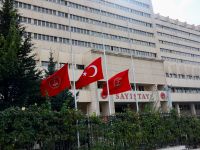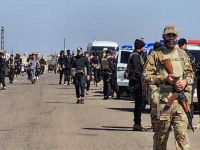Domestic air services ware recently launched in Iraq for the first time since the 1991 Gulf War, with Iraqi Airways planes traveling from Baghdad to Basra and Mosul, both in no-fly zones patrolled by a US and British force.
An Ilyushin plane of Iraqi Airways traveled to Basra in southern Iraq while an Antonov, another Russian-built cargo aircraft converted for passenger use, flew to for the northern city of Mosul, the official news agency INA said.
More than 120 passengers, including foreign journalists and artists, were on board the Ilyushin for the 50-minute flight to Basra and about 40 on the Mosul flight, both of which arrived safely. Thousands of demonstrators waving portraits of President Saddam Hussein were at Basra's airport to hail the arrival of the first flight, said an AFP journalist on board.
Iraqi Airways, which also has six helicopters available but whose regular fleet is stranded abroad, has announced it will provide a daily service on the two routes. Officials at the United Nations have said that Iraqi domestic flights, suspended since the Gulf War over Kuwait, are legal under UN sanctions.
But a spokesman for the US diplomatic mission in New York said last week that "for reasons of safety, it would be helpful if Iraq notified the UN about schedules and routes." This would avoid possible incidents in the no-fly zones. Iraq's Transport Minister Ahmad Murtada, however, said his country would not satisfy the US request.
"We are free on our land and in our skies, and will not ask for authorization from anyone. That's our decision," the minister said at Baghdad's airport as the planes departed. Foreign Minister Mohammad Said al-Sahhaf was more forceful in his defiance. "To hell with the American threats," he said during a visit to Cairo. "These flights will continue despite the threats because they intend to shatter the criminal imposition of the two no-fly zones," he said. "They'll continue until this game ends."
Britain and the United States enforce the zones above the 36th parallel and below the 33rd to keep out Iraqi military planes, in a declared mission to protect the Kurds and Shiites of northern and southern Iraq respectively.
Their patrols launched from Turkey, Kuwait, Saudi Arabia and carriers in Gulf waters result in frequent clashes with the air defenses of Iraq, which refuses to recognize the zones that are not covered by any UN resolution.
The US State Department warned the rising number of foreign flights to Baghdad to stick to the air corridor over central Iraq. The resumption of domestic flights follows the reopening on August 17 of Saddam International, which was closed after the UN Security Council imposed sanctions on Iraq for its August 1990 invasion of Kuwait.
Almost 50 foreign planes have since landed in Baghdad despite a UN air embargo. Iraq insists the international sanctions regime does not cover passenger flights, while the UN Security Council is divided on the issue.
Iraqi Airways, grounded for the past 10 years, had a fleet of around 30 planes, which have been stranded in Iraq, Iran, Jordan, Libya and Tunisia. Murtada said Sunday he raised the issue of the planes flown to Iran for safety during the Gulf conflict with his Iranian counterpart Mahmud Hojati, who visited Iraq for the Baghdad trade fair. "No maintenance has been carried out on these planes," Murtada complained.
Baghdad is looking to buy 20 Airbus planes from the European consortium, according to Iraqi newspapers. It ordered five A-310 passenger jets in 1989, but their delivery has been blocked by the sanctions.
The official Syrian government daily Tishrin said Sunday Iraqi Airways had started refurbishing its offices in Damascus in case of a resumption of regular flights between Iraq and Syria. The newspaper did not say when the offices would reopen.
Several humanitarian flights have traveled to Iraq from Syria since October 8 in the first direct air connections between the two countries since they broke off diplomatic relations in 1980. Governed by rival factions of the Baath party, Syria and Iraq began in 1997 to normalize their relations and opened up their border to officials and businesspeople.
Iraqi Transportation Minister Ahmad Murtada called for starting regular cargo flights between Beirut and sanctions-bound Baghdad, a statement by Lebanon's Trans Mediterranean Airlines (TMA) said last week. A statement faxed to said TMA, which was the first Lebanese airline to make a solidarity flight to Baghdad on October 13 after obtaining UN permission, sent October 24, an aircraft carrying 130 Lebanese trade union leaders flew to Baghdad in a solidarity gesture with Iraq.
Iraqi Airways has started setting up its offices in Damascus in case of a resumption of regular flights between Iraq and Syria, the Syrian governmental newspaper Tishrin said last week. Officials at the Iraqi state carrier "hope to open direct air links between Baghdad and Damascus," Tishrin said. The newspaper did not say however when the Iraqi Airways office will reopen. — (AFP, Baghdad)
© Agence France Presse 2000
© 2000 Mena Report (www.menareport.com)








